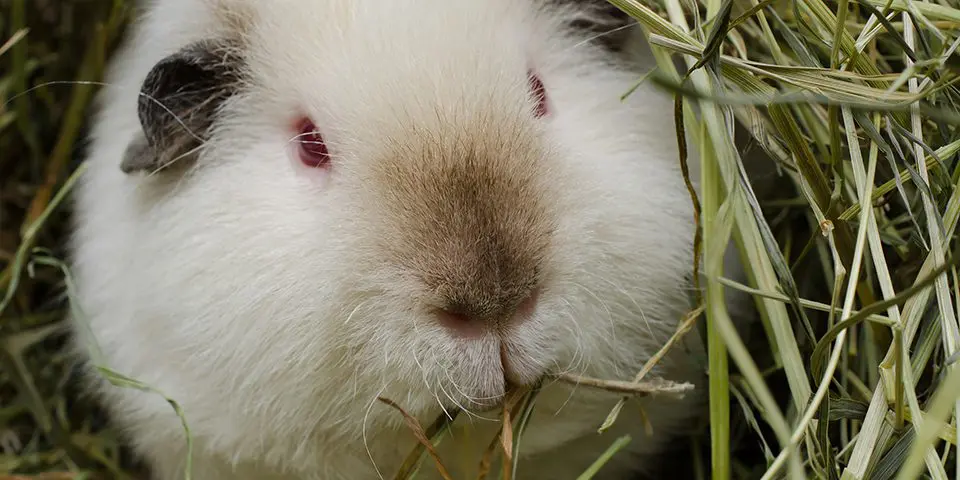Updated: May 30, 2024
Your guinea pig is a central member of your family, and we know you want to provide your piggy with everything they need to be happy and healthy. That’s why we’ve put together this collection of essential guinea pig care tips to help you learn how to take care of a guinea pig.
In this article, we’ll cover the following important topics:
- Feeding your guinea pig
- Guinea pig behaviors
- Enriching your guinea pig’s world
- Housing your guinea pig
- Essential guinea pig supplies
- Your guinea pig’s health
What Do Guinea Pigs Eat?
- Grass hay is the most important component of every herbivore’s diet, and your guinea pig is no exception! The high amounts of beneficial fiber in hay help meet the important digestive and dental health needs of guinea pigs and other small herbivores. Your guinea pig should have unlimited access to hay.
- A daily recommended amount of uniformly nutritious fortified food provides essential nutrients (e.g., vitamins and minerals) not found in hay.
- Fresh, guinea pig-friendly leafy greens are an essential component of every guinea pig’s daily diet.
- Healthy treats, while not nutritionally essential, can help make your relationship with your rabbit more fun and meaningful.
Hay is Essential for Guinea Pig Nutrition
It’s important for your guinea pig to have unlimited access to a variety of quality grass hays. Hay helps prevent obesity, boredom, and serious health issues related to dental and gastrointestinal disease. Replacing the hay in your guinea pig’s habitat can encourage picky eating, so we recommend changing it only when soiled. Offer a variety of types of grass hay to further discourage unhealthy picky eating habits.
Young (less than 6 months old), pregnant, nursing or ill animals can benefit from eating alfalfa hay in addition to grass hay because of the higher nutritional content (including higher levels of protein and calcium). Otherwise, alfalfa should only be given to your guinea pig occasionally as a treat.
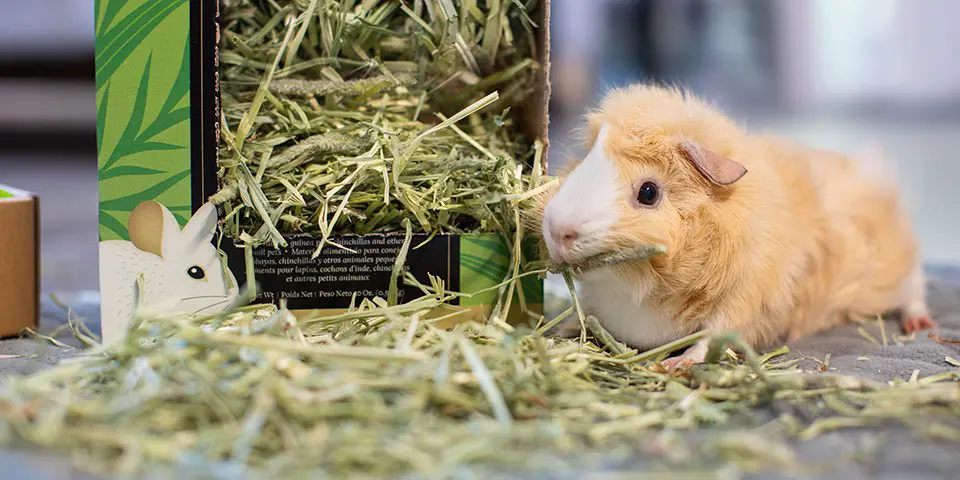
How Do I Choose the Right Hay for My Guinea Pig?
Keep in mind that grass hay should make up the majority of your pet’s daily diet. Offer a variety of types of grass hay to your guinea pig to promote optimum health. Use the Taste & Texture Guide located on every Oxbow hay package to determine your pet’s unique taste and texture preferences.
Provide Essential Nutrition with Pelleted Food
Providing a daily recommended amount of high-fiber, age-appropriate fortified food will help ensure that your pet receives essential nutrients not found in hay.
Always choose an age-appropriate, uniformly nutritious food formulated specifically for guinea pigs. Oxbow offers a number of quality food lines to meet the unique preferences of all piggies.
Unsure which to choose? Don’t worry! We’ve created a side-by-side look at the unique characteristics of each of our food lines to make the decision easier!
It’s important to remember that not all pets foods are created equal. Some options, like seed blends, promote unhealthy selective feeding behaviors that can lead to serious health conditions. Learn more about the differences between uniform and mix-based foods and what this means for your guinea pig’s health.
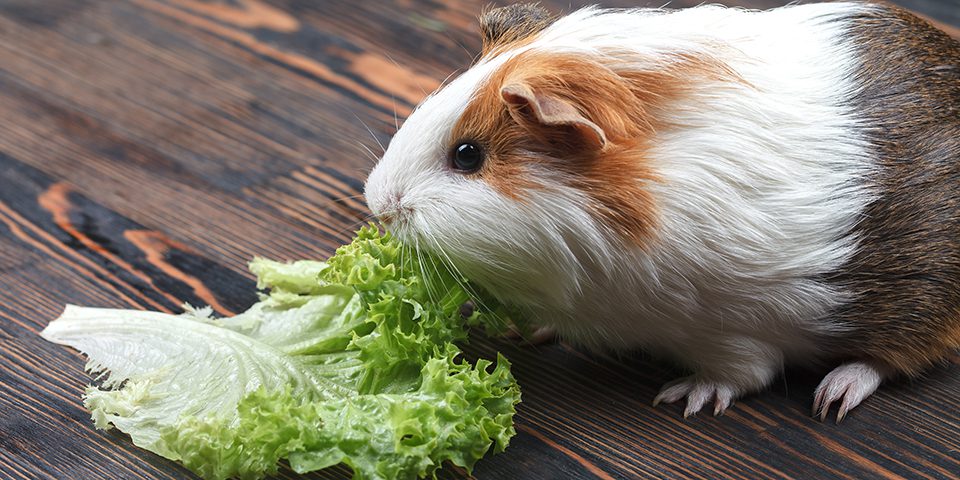
Leafy Greens are Rich in Vitamin C
Fresh greens are an important part of your guinea pig’s daily diet. Greens help keep your piggy hydrated and offer important vitamins and minerals, as well as offer nutritional enrichment. Romaine, bib, and red leaf lettuce are good greens to offer, but avoid foods in the onion family such as leeks, chives, and onions. Learn more about the best leafy greens for guinea pigs.
Treats For Guinea Pigs
Treats (including fruits and veggies) are great for encouraging interaction between you and your pet, but they should never take the place of essential daily foods. Offering too many treats can lead your guinea pig to refuse their healthy, essential foods. Not all treats are created equal, either! All Oxbow Simple Rewards treat varieties are designed to be as wholesome as they are delicious.
Guinea Pig Behaviors
Caring for guinea pigs doesn’t end with nutrition; it also involves learning about their unique behaviors.
Guinea pigs are most active at dawn and twilight, taking naps throughout the day.
- Sounds: Guinea pigs often show their affection through different vocalizations. For example, you may hear a sound called “wheeking” when your pet is excited or looking for a treat.
- Signs of happiness: Also, your guinea pig may “popcorn” – bounce excitedly and repeatedly to express happiness. The best way to interact with your guinea pig is to play with him on the floor. As creatures of habit, guinea pigs need to be introduced to changes slowly in regard to feeding and routines.
- Socialization: Guinea pigs are social creatures that enjoy the company of others. If your lifestyle and finances support it, we recommend that every guinea pig has a friend. Experiencing the companionship of another guinea pig will add to the quality of life for both pets and prevent boredom when you’re not home or in those moments when you’re unable to interact with your pet.
Some guinea pig behaviors can seem strange at first. For example, you may see your guinea pig eat its own poop. This is normal, healthy behavior that provides essential vitamins and nutrients.
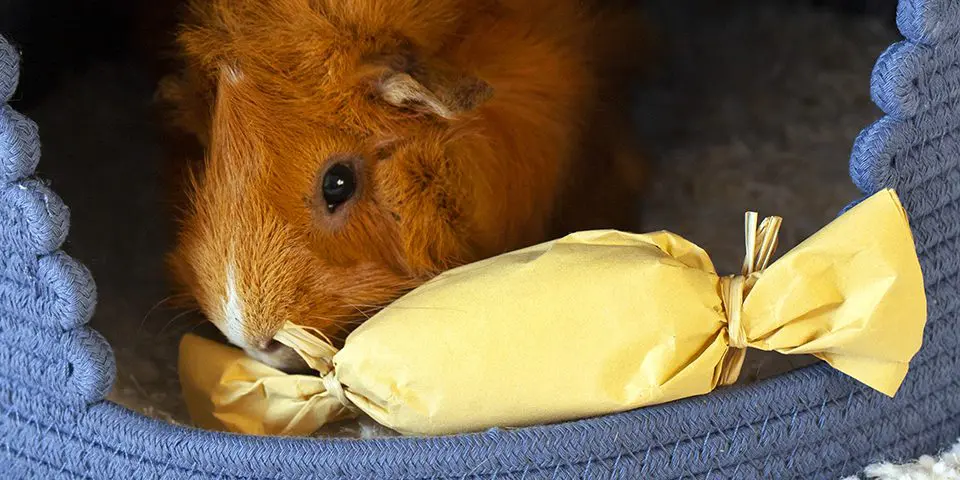
Enrichment Supports Natural Instincts
All guinea pigs are wired to engage in a set of healthy instinctual behaviors each day. These behaviors include chewing, playing, hiding, and exploring. Intentionally encouraging these behaviors in healthy ways is called enrichment. Support all four behaviors in a variety of ways each day to support your guinea pig’s mental and physical health.
Chewing
Chewing is an instinctual behavior of guinea pigs and provides important health benefits. Guinea pigs have open-rooted teeth that never stop growing. Chewing supports dental health by keeping your guinea pig’s teeth worn down in a healthy manner. To support your guinea pig’s chewing needs, provide a variety of safe, healthy chew toys each day.
Hiding
Guinea pigs are prey animals that possess the instinct to run and hide to escape predators in the wild. Even in the safe, domesticated confines of your home, your guinea pig’s prey instincts will remain intact. To support this instinct, it’s important to provide multiple hiding spaces for your guinea pig to retreat to in order to cope with stress throughout the day.
Exploring
Guinea pigs love to explore their surroundings when they feel safe. In their native habitat, guinea pigs constantly explore their surroundings as they forage for food. You can encourage your guinea pig to explore their habitat by offering enrichment accessories designed to engage your pets mentally and physically.
Playing
Guinea pigs are playful creatures by nature. A playful guinea pig is an active guinea pig; daily playtime for guinea pigs supports their mental and physical health. Offer your guinea pigs a variety of play toys to keep them active and engaged each day.
Building the Right Guinea Pig Habitat
It’s easy to make guinea pigs feel at home inside your house. As prey animals by nature, all guinea pigs (even those who free roam in the house) need a safe place where they can spend time and escape potential environmental stressors. Choose a spacious, quality habitat with a solid floor and set it up near household activities, but away from drafts. Your guinea pig’s habitat should be outfitted with environmental essentials such as a hay habitat (Timothy CLUB Bungalow or Tunnel), a litter box lined with litter and bedding, multiple chews, grass hay, a food bowl, and two sources of fresh, clean water.
Essential Supplies For Your Guinea Pig
Every guinea pig should have daily access to basic supplies for health and happiness. Make sure you’re stocked up on the following:
- Age-specific fortified food:
- For guinea pigs under six months of age, choose Essentials Young Guinea Pig Food, Garden Select Young Guinea Pig Food, or Simple Harvest Young Guinea Pig Food
- For guinea pigs between six months of age and 4 years of age, choose Essentials Adult Guinea Pig Food, Garden Select Adult Guinea Pig Food, Organic Bounty Adult Guinea Pig Food, Simple Harvest Adult Guinea Pig Food, or Forage Wise Adult Guinea Pig Food
- For guinea pigs older than 4 years of age, choose Essentials Senior Guinea Pig Food
- Two or more varieties of Oxbow’s farm-fresh hay
- A variety of natural chews and miscellaneous enrichment items to support your guinea pig’s chewing, exploring, and playing instincts
- Oxbow treats for healthy bonding and enrichment
- Two sources of water (both a bottle and dish)
- Heavy food bowl
- Large habitat with solid, non-slip flooring
- Large play yard (i.e. x-pen) for safe exercise outside the habitat
- Multiple hiding spaces for rest and relaxation
- Litter and bedding material
- A layered combination of Eco-Straw litter (bottom) and Pure Comfort bedding (top) makes an ideal substrate
- Natural Science Vitamin C Supplement, as needed
- In times of stress, a guinea pig’s need for vitamin C can fluctuate. Supplement with Natural Science Vitamin C to ensure your guinea pig is getting what he needs.
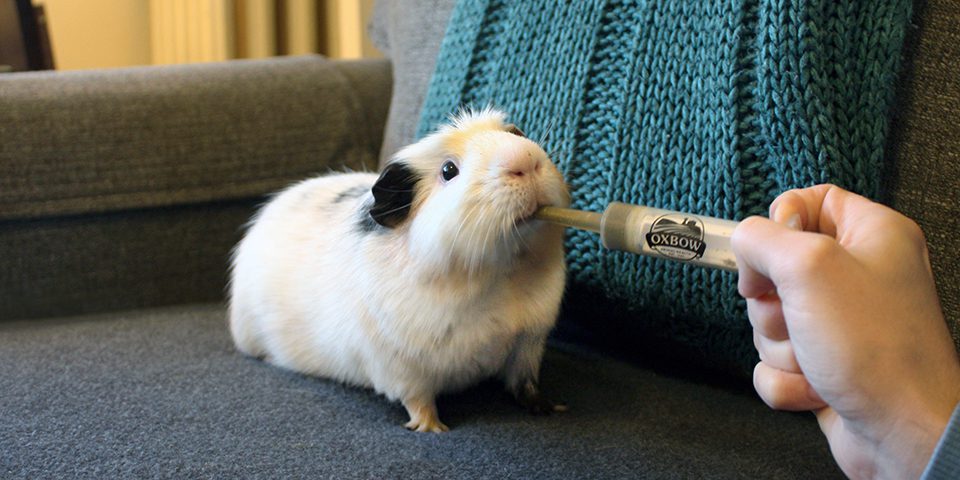
Monitor your Guinea Pig’s Health
Many guinea pig health problems are a result of nutrition, diet, digestive and dental issues. Contact your veterinarian if you notice any of the following symptoms:
- Loose, soft, or lack of stool
- Small, dry, or infrequent stools
- Blood in the urine
- Sneezing or trouble breathing
- Hunching in a corner or lack of activity (lethargy)
- Overgrown front teeth
- Observed difficulty with chewing
- Bald patches in the fur
- Sores on the feet
- Abnormal eating or drinking
Still have questions about how to care for a guinea pig? Our experts are here for you! Please contact us by phone or email and we’ll be happy to assist you in giving your little one a healthy life.

